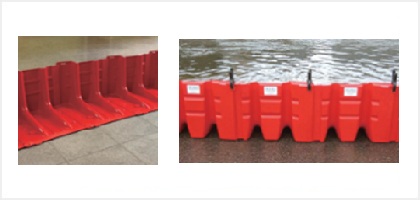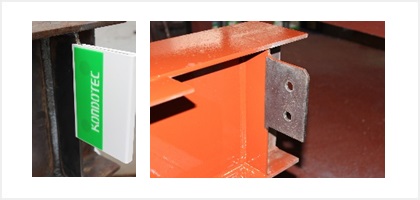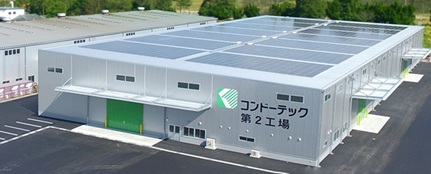Sustainability
ENVIRONMENT
Environmental Initiatives
Environmental contribution target in VISION 2040
In the long-term vision, VISION 2040, the KONDOTEC Group aims to contribute to the global environment and has set an environmental contribution target of reducing Scope 1 and Scope 2 GHG emissions (market- based method) by 30% by 2040, compared with the level in the fiscal year ended March 31, 2024.
Based on our environmental policy, we will operate our business with consideration given to creating future environmental value, coexistence and harmony with the environment. We will thus aim to be a company that inspires our earth planet.
Environmental Policy
Since its foundation in 1953, KONDOTEC has created and co-existed with future environmental value and engaged in business activities paying due consideration to the environment for the realization of a sustainable society, while contributing to the creation of an affluent society through the enhancement of social infrastructure by providing products and merchandise to various industries over a half century.
- 1. We will comply with legal regulations and matters agreed on by the Company for the environment regarding business activities, products and services.
- 2. We will endeavor to reduce environmental burdens, reduce environmental pollution risks, and protect biological diversity and ecological systems by saving energy and resources, promoting recycling, reducing waste, reducing the consumption of chemical substances and engaging in green procurement.
- 3. We will continue to improve our activities by utilizing the environmental management system, setting environmental targets to achieve the Environmental Policy, conducting evaluations on environmental performance, and reviewing them regularly.
- 4. We will thoroughly inform all employees of the Environmental Policy and endeavor to conduct necessary education and enlightenment activities to engage in environment conservation activities.
Response to climate change and information disclosure based on TCFD recommendations
At KONDOTEC, in considering a path for sustainable growth, we do take into account the significant impact issues associated with climate change will have on future business activities. We are currently taking steps to recognize the impact our business activities have on the environment by management of emissions, and other measures. We view the shift to a low-carbon society as a key opportunity for us, and looking ahead we will look to pursue information disclosure based on TCFD recommendations, while implementing measures addressing climate change.
Risk management system
In collaboration with all divisions Company-wide, SDGs Promotion Department compile, assess, and identify risks and opportunities facing KONDOTEC in relation to climate change. Climate-related risks and opportunities that have been assessed and identified are reported to the Board of Directors for further supervision.
Main risks and opportunities associated with climate change
Based on discussions with internal divisions, we conducted a scenario analysis(*) to identify the Company’s current climate-related risks and opportunities, as shown in the table below. The level of financial impact is assumed at the maximum value under scenarios ranging from 1.5/2℃ to 4℃.
| Category | Description | Financial impact(*) |
Planned Actions | ||
|---|---|---|---|---|---|
| Transition Risks | Political policy and laws and regulations | Introduction of a carbon tax | Increased costs through the implementation of a carbon tax on CO₂ emissions from business activities (mainly the manufacturing process and logistics) | Large | Introduction of and transition to renewable energy |
| Tightening of regulations concerning low carbon initiatives | Impact on business performance by disrupted supply-demand balance due to reduced production at blast furnace companies and decreased construction demand | Large | Reduction of energy consumption and introduction of energy-saving facilities and equipment at factories | ||
| Market | Promotion of renewable energy | Rising procurement and raw material costs driven by increased energy prices | Large | Inspect low carbon initiatives at partner factories and suppliers | |
| Transition Opportunities | Political policy and laws and regulations | Introduction of a carbon tax | Business expansion related to renewable energy | Large | Bolster procurement capabilities and production system for increased demand for products used in renewable energy facilities |
| Reduction of CO2 emissions and transportation costs by developing local suppliers to promote local production and consumption | Large | ||||
| Increased possibilities for product ideas and development related to eco and environment through a wide range of commercial channels | Large | Strengthen synergies with Group companies (promoting sales of solar power generation facilities and LED lighting, enhanced facility development capacity) |
|||
| Market | Promotion of renewable energy | Increase in orders due to an increase in renewable energy facilities | Large | Environment & Energy Group, established in April 2025, is expanding sales of renewable energy-related products and merchandise. | |
| Physical Risks | Acute | Increase frequency of extreme weather events | Impact on the supply of raw materials and merchandise due to damages to the supply chain | Small | Ensure multiple avenues for purchasing |
| Small | Prepare logistics simulations and plans for emergencies | ||||
| Small | Utilization of the logistics network between operating sites | ||||
| Chronic | Rising in the average temperature | At factories, increased costs due to reduced production efficiency and countermeasures | Medium | Installing spot coolers Switching to energy-efficient air conditioning |
|
| Physical Opportunities | Acute | Increase frequency of extreme weather events | Increased opportunity to sell disaster preparation merchandise | Large | Expand the lineup and inventory of disaster preparation products and merchandise |
| Increased demand for repair and reinforcement work on rivers and banks | Large | Expand sales channels for products and merchandise used in civil engineering works | |||
| Chronic | Extreme variability in weather patterns | Increased opportunity to sell seasonal merchandise addressing heat stroke and other issues | Large | Expansion of the seasonal merchandise lineup | |
* Scenario analysis was conducted with reference to multiple climate scenarios, including the Intergovernmental Panel on Climate Change (IPCC) RCP2.6 (2℃ scenario) and RCP8.5 (4℃ scenario), as well as the International Energy Agency (IEA) World Energy Outlook 2024 (WEO).
* The financial impacts, if realized, are classified as follows under the 1.5℃/ 2℃-4℃ scenarios.
Large: 100 million yen or more, Medium: 10 million yen or more but less than 100 million yen, Small: Less than 10 million yen
Products and merchandise addressing climate-related risks and opportunities
Boxwall

To address physical risks and opportunities such as the increasing frequency of extreme weather events and annual flood damage, this flood protection system provides strong protective performance and mobility. It is highly cost-effective, reusable, and has been widely adopted by local governments to safeguard structures, including buildings and household contents.
Mash up cover

In response to transition risks and opportunities, such as the introduction of a carbon tax, we anticipate proposing eco- and environment-related products and merchandise that leverage a wide range of commercial channels. As an example, we offer the “Mash up cover," which contributes to waste reduction. In building materials, joints are intentionally allowed to rust so that the materials can be secured to each other through friction bonding. To prevent paint from covering these joints, surfaces were previously protected using masking tape or similar methods. With the development of the mash-up cover, it is now possible to provide this protection without generating any waste.
Initiatives for reducing of environmental impacts
Installation Solar power generation
Our two factories, Sanwa Denzai Co., Ltd. and TOKAI STEP CO., LTD. operate the solar power generation system in our power sales business.
In Electrical Equipment and Structural Steel Materials segments, we handle materials related to solar power generation systems and frames respectively, and focus on sales through synergies within the KONDOTEC Group.

Shiga Factory No.2
Quick delivery by four-factory structure and inventories at each operating site
KONDOTEC established factories at four locations in Japan (Hokkaido, Ibaraki, Shiga and Fukuoka), with made-to-order products such as braces and anchor bolts produced at and shipped from the nearest factory to the customer. Thanks to the four-factory structure, we reduce costs and risks associated with delivery and GHG emissions and enable to realize quick delivery. For products and merchandise which can be stored as inventories, in addition to inventories at logistics centers, we keep a certain amount at warehouses established at individual operating sites so that we can respond to abrupt demand while realizing environmental burdens and cost reduction ,and quick delivery.
Acquisition of ISO14001
We obtained ISO14001, international standards for environmental management, at all four factories, engaging in environment-friendly operations for factories.
Environmental conservation activities
As part of efforts to reduce GHG emissions, KONDOTEC has begun plans to replace Company cars with EVs, and to switch to renewable energy sources to power Company facilities. Such moves to EVs and renewable energy power sources have already gotten underway at our Head Office in 2021.
In addition, as a component of our initiatives to reduce waste, in the transport of materials from factories and logistics center to operating sites, we are operating a model by which wooden pallets, previously discarded at sites, are gathered at sites and returned to nearby factories or logistics center for reuse.
Management of emissions(Material balance)
To achieve its GHG emissions reduction target, KONDOTEC began calculating Scope 1 and 2 emissions for its domestic group companies and Scope 3 emissions for KONDOTEC INC. in the fiscal year ended March 31, 2024. The Company calculates GHG emissions in accordance with the GHG Protocol, an international GHG accounting standard.
GHG emissions(t-CO₂)
| 2024 | 2025 | |
|---|---|---|
| Scope1 | 3,693 | 3,725 |
| Scope2 | 4,601 | 4,274 |
| Scope3 | 435,749 | 439,200 |
* Scope 1 and 2 emissions are Consolidated figures and do not include overseas group companies.
* Scope 2 figures are calculated in accordance with the market-based method.
* Scope 3 emissions are for KONDOTEC only (non-consolidated). Of these, Category 8 (Upstream Leased Assets), Category 13 (Downstream Leased Assets), Category 14 (Franchises), and Category 15 (Investments) are not subject to calculation because the Company has no corresponding activities.
* Scope 3 Category 11 (Use of Sold Products) is limited to generators (HPG3000i and HPG3000is) with estimated lifetime gasoline consumption.
Material balance
The following illustrates the overall input-output balance and expenditures and revenues during the course from research and development to manufacturing within the business activities of KONDOTEC.
Actual results of four factories of the Company are used.
INPUT
Raw Materials |
Iron and Steel | 24,660t |
|---|---|---|
| Coating Material | 90m3 | |
Energy |
Electricity | 5,302 thousand kWh |
| Natural Gas | 0m3・N or PJ | |
| LPG | 61t | |
| Diesel Fuel | 0.3㎘ | |
| Kerosene | 10㎘ | |
| Heavy Oil | 0.6㎘ | |
| Irrigation Water | Water | 4,750m3 |
OUTPUT
| Production | Iron and Steel Products | 24,157t |
|---|---|---|
| Air Emission | CO₂ |
2,450t-CO₂ |
| Industrial Waste/Byproduct | Recycled Volume |
2,552t |
| Amount of Outsourced Disposal | 182t |
|
| Drainage | Water | 4,750m3 |
(FY 2025)
<Main expenditure relating to environmental protection>
Shiga Factory :Solvent recovery equipment / Paint thinner recycling equipment(1 million yen)
Sapporo Factory:Paint thinner recycling equipment(1 million yen)
<Main revenues relating to environmental protection>
Revenues in business for recycling waste (e.g. steel scraps) generated from major business activities or recycling used products, etc. (95 million yen)
